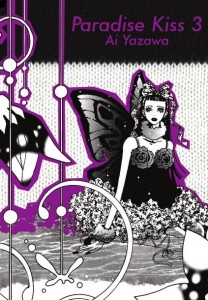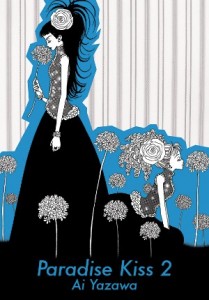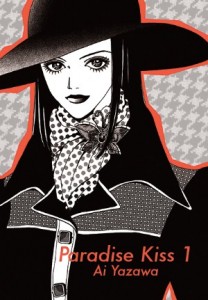By Ai Yazawa. Released in Japan by Shodensha, serialized in the magazine Zipper. Released in North America by Vertical, Inc.
The cover of this final volume of Paradise Kiss features Yukari, looking gorgeous in that vaguely ridiculous way that haute couture always does, with butterfly wings on her back and roses on her breasts, staring off towards the camera looking like she’s about to cry. It could almost be one of her model shoots, except that none of them really want that kind of emotion – they want happy, relaxed, “wow, I want to be like her so I will buy this product” Yukari – or, when she’s modeling with George, “Wow, I want George so I will be like her.” Yukari is best in modeling when she’s self-assured and casual, which is the exact opposite of her teenage years and her relationship with George.
There was a point about halfway through this volume when I’d really had it up to here with Yukari, as her self-loathing, jealousy, and highly wrought emotional state all come together at once with the arrival of Kaori, George’s old classmate and friend. Not only is she the one girl who seems to have resisted his advances – but she’s become successful, seems to have her act together, and also manages to be the one to advance the plot (and George’s career) when George himself is unable or unwilling to. And yet she’s not with George – and neither is Yukari, as after this scene I think George has realized that being with her as a couple is bad for both of them individually.
Yukari has realized this too, of course, but wants desperately to cling to what she has anyway. We’ve all been there – it’s our first love, so we’re determined to make it work even when there’s all sorts of evidence that it won’t. It’s hard to let go. In addition, it’s all too easy to let fear and self-hatred put things in a holding pattern as well. This is Arashi’s issue, who can’t understand why Miwako doesn’t hate him, especially as she knows she still loves Hiro. Of course, it’s because she loves Arashi, and is trying hard to make things work. They, unlike George and Yukari, have a relationship where they’re better people together than they are separately. Arashi’s still bad with words, but his inviting Hiro to the shrine visitation speaks volumes.
Of course, just because the two leads aren’t a good couple in the long run didn’t mean there wasn’t a lot of love and affection there. George’s final gesture to Yukari is typically grandiose, but also shows how much she really meant to him, even if he didn’t always communicate it properly. It could be argued that the epilogue is a bit overly happy – Yukari is successful as a model and actress, George is designing Broadway shows, Arashi and Miwako have a kid – but that’s pretty much exactly what we want from the series. This was about a group of overambitious, overemotional overachievers. They crashed and burned in their teenage years, both in love and in the ParaKiss brand, but it only gave them more strength. Yukari gets told at one point, worrying about embarrassing herself on a catwalk, “Well, yeah, you’re gonna do that, all models do at first.” By not giving up, and keeping that drive for success and happiness, Yukari and her friends earn the right to their shiny happy ending. Even if, like Yukari, you’ll tear up a bit as well.



